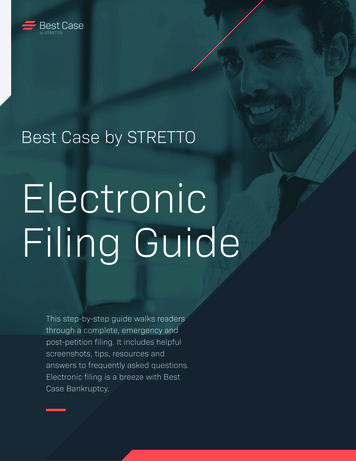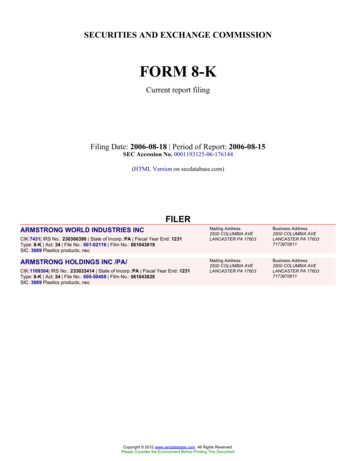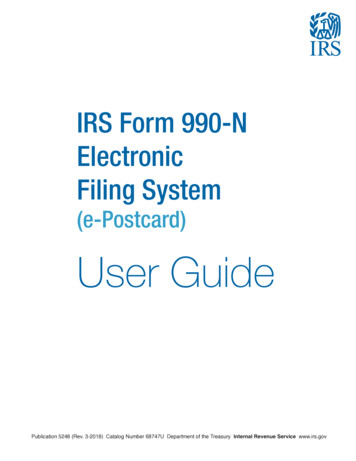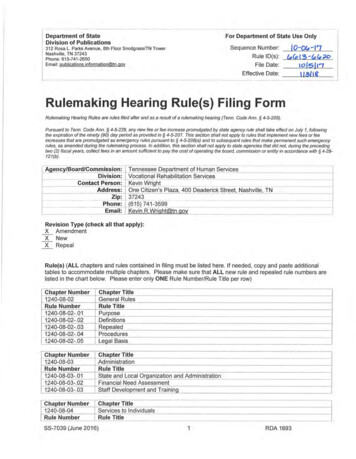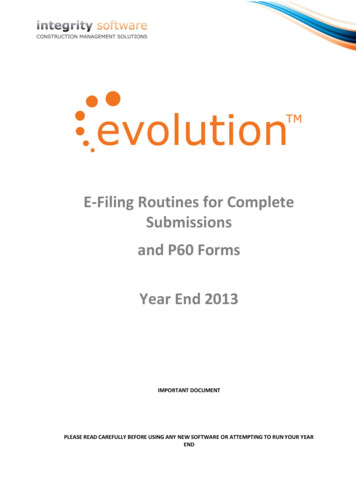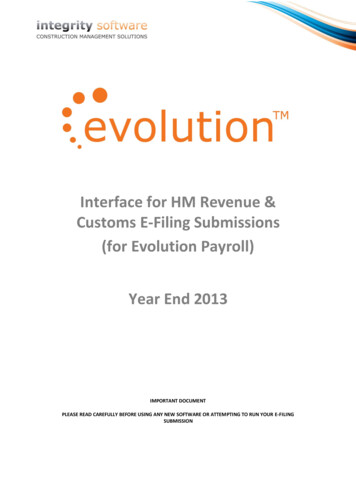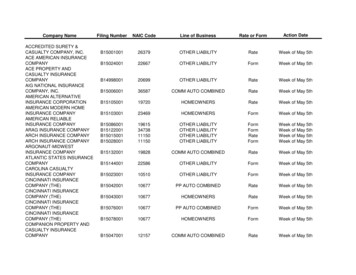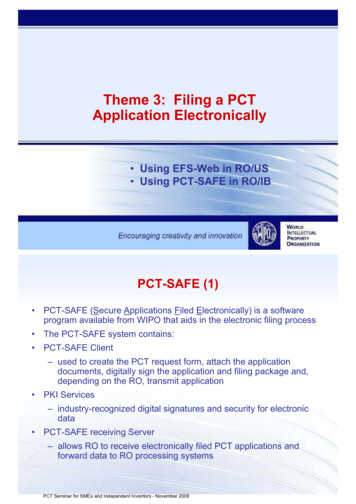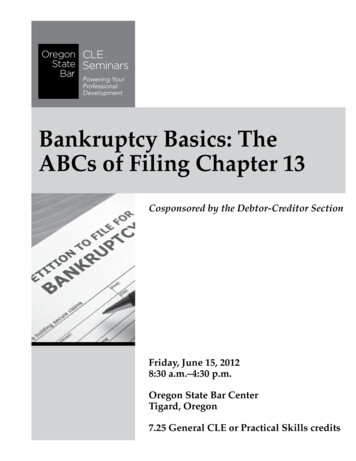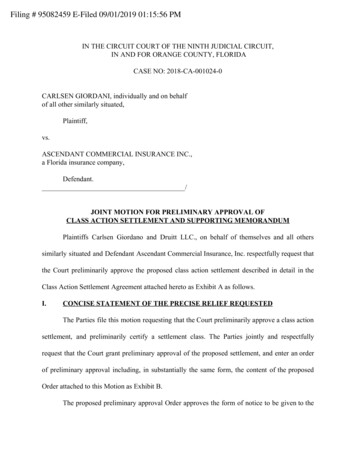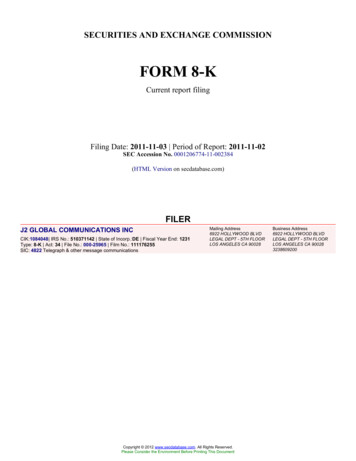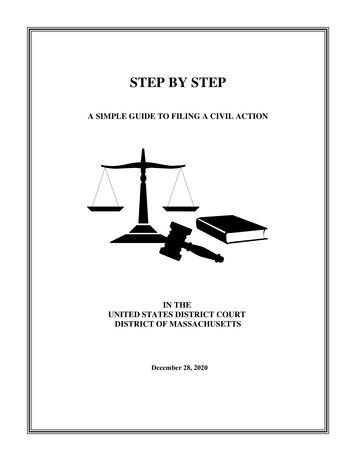
Transcription
STEP BY STEPA SIMPLE GUIDE TO FILING A CIVIL ACTIONIN THEUNITED STATES DISTRICT COURTDISTRICT OF MASSACHUSETTSDecember 28, 2020
STEP BY STEPA Simple Guide to Filing a Civil ActionYou believe that you have been injured or wronged by someone, some individual, corporation orgovernment agency. You also believe you should be compensated for the harm you have suffered. In order toaccomplish this, you have decided to file a civil suit in the United States District Court, without the help of anattorney.FUNDAMENTAL INFORMATIONFirst, there are a few simple concepts you must get to know and understand.The PLAINTIFF is the person who files the lawsuit.The DEFENDANT is the person who is being sued.If the you are representing yourself without the benefit of an attorney, you are known as a PRO SELITIGANT. "Pro Se" is a Latin term meaning "for yourself."As a pro se litigant, you enjoy every right entitled to you under the law. You need not worry if you havehad little or no experience with the courts before. However, pro se litigants are expected to follow/abide by therules that govern the practice of law in the Federal Courts. Pro Se Litigants should be familiar with the FederalRules of Civil Procedure and the Local Rules of this court. The Local Rules are available In the Clerk’s Office oron the Court’s website - www.mad.uscourts.gov. The Federal Rules can be accessed in any law library orthrough the Federal Judiciary’s website - www.uscourts.gov.FEDERAL COURT vs STATE COURTThere is a difference between State Court and Federal Court. The difference being in what types ofcases (law suits) they can decide. This is called JURISDICTION. State Court has general/broad jurisdiction,and Federal Court has limited/specific jurisdiction. Under Federal Court jurisdiction, the two main types of casesare Federal Question Cases (see 28 U.S.C. § 1331) and Diversity Cases (see 28 U.S.C. § 1332).Step by StepRevised December 28, 2020 - U.S.D.C. - MassachusettsPage 2
FEDERAL QUESTION CASES:are cases where the issue involves violation of Federal Law.DIVERSITY CASES:are cases where the Plaintiff and Defendant are citizens ofdifferent states and the amount in controversy exceeds the sumor value of 75,000., exclusive of interest and costs.STEP ONE: WRITE YOUR COMPLAINTAll cases are comprised of documents prepared and filed by litigants. The most common documents arethe complaint, answer and motions. The first document that you must write is called a COMPLAINT (Attachment 1). The function of the COMPLAINT is to tell the Court and defendant the reason for filing thelawsuit and what relief you desire. The COMPLAINT is made up of four main parts:1.The NAME AND ADDRESS of the plaintiff and the defendant. These are usuallylisted in the first and second paragraphs respectively. If there is more than onedefendant, list each defendant's name and address in separate additionalparagraphs.2.The JURISDICTION or reason your case is being filed in this federal court. See 28U.S.C. §1331 et seq.3.The ALLEGATIONS or claims that you are making against the defendant. Placeeach allegation in a short, clearly-written paragraph. See Rule 10 Federal Rules ofCivil Procedure4.The RELIEF you are seeking from the court. This can be money or something youwant the judge to make the defendant do or stop doing. This information is usuallywritten in the last paragraph of the COMPLAINT.Please be sure to number each paragraph except for the paragraph that asks the court for relief. If youbelieve you are entitled to a trial by jury, you must indicate in a paragraph following the relief requested that youclaim trial by jury. See Rule 38(b) of the Federal Rules of Civil Procedure.Do not worry that your COMPLAINT is not professionally written. The court will take into considerationthat you are a PRO SE litigant and untrained in drafting legal documents. You should, however, make everyeffort to state your case in clear, concise terms. See Rule 8 and 10 of the Federal Rules of Civil Procedure.Forms for filing a petition under Title 28 U.S.C. §2254 for writ of habeas corpus by a person in statecustody or a motion under Title 28 U.S.C. §2255 to vacate, set aside, or correct sentence by a person in federalcustody are available from the PRO SE clerk.Step by StepRevised December 28, 2020- U.S.D.C. - MassachusettsPage 3
All pleadings submitted to this court must be on 8 1/2 x 11" paper. See Rule 5.1 of the Local Rules ofthis Court.STEP TWO: FILE YOUR COMPLAINTYour next step is to file the COMPLAINT with the court. In addition to filing the COMPLAINT, thefollowing forms will have to be completed and submitted with the complaint:1.2.3.A Civil Cover Sheet - (Attachment 2)A Civil Category Sheet - (Attachment 3)A completed SUMMONS for each defendant - (Attachment 4)You will also have to pay a filing fee of 402.001 at the time you file your COMPLAINT and cover sheets.The filing fee for a petition for writ of habeas corpus is 5.00. The filing fee, however, may be waived if youcannot afford to pay it. For more information, see below. All checks or money orders should be made payableto: "CLERK, UNITED STATES DISTRICT COURT".IF YOU CANNOT AFFORD TO PAY THE FILING FEE you may be allowed to have the filing feewaived if you fill out the following form and send it to the court with the COMPLAINT, Cover Sheets andcompleted Summons forms:1.Application to Proceed Without Prepayment of Fees and Affidavit(AO 240 (Rev. 10/03)) (Attachment 5)When you file the COMPLAINT, Cover Sheets, Summons forms and Application to Proceed WithoutPrepayment of Fees, each of these will be reviewed and forwarded to a United States District Court Judge for hisor her consideration. If your Application is approved, the filing fee will be waived and your case will be drawn toa United States District Judge. If your Application is not approved, you must pay the filing fee to have your casefiled and drawn to a United States District Judge. Ask the PRO SE clerk for more information on this subject.PRISONERS are now required to pay the full filing fee of 402.00 for civil actions, 5.00 for habeascorpus applications under 28 U.S.C. §2254 and 455.002 for appeals in forma pauperis. If insufficient funds exist12The filing fee for civil action cases was increased from 350.00 to 402.00 effective December 1, 2020.The filing fee for appeals was increased from 255.00 to 455.00 effective April 9, 2006.Step by StepRevised December 28, 2020 - U.S.D.C. - MassachusettsPage 4
in the prisoner's account, the court must assess and, when funds exist, collect, an initial partial filing fee of 20percent of the greater of:(1)(2)the average monthly deposits to the prisoner's account; orthe average monthly balance in the prisoner's account for the prior six-month period.Thereafter, the prisoner will be required to make monthly payments of 20 percent of the precedingmonth's income. The agency having custody of the prisoner must forward payments from the prisoner's accountto the clerk of court each time the amount exceeds 10.00 until the filing fees are paid in full. See 28 U.S.C.§1915 as amended effective April 26, 1996 (Attachment 6 ) regarding proceedings In Forma Pauperis pursuantto the Prison Litigation Reform Act (Pub. L. No. 104-134, 110 Stat. 1321.)A PRISONER who cannot pay the entire filing fee and who is seeking to proceed in forma pauperis mustsubmit along with the complaint, cover sheet, category sheet and summons:1.the Application to Proceed Without Prepayment of Fees and Affidavit form (AO 240 (Rev.10/03)) with:a.2.completed certificate portion of the AO 240 form by the institution of incarceration; andcertified copy of the prisoner's trust fund account (or institutional equivalent) for the prior sixmonth period.STEP THREE: JUDICIAL REVIEW OF COMPLAINTOnce you have submitted all of the necessary papers, the court will review the complaint and otherdocuments and shall dismiss the case at any time if the court determines that:1.2.the allegation of poverty is untrue;the action or appeal -a.is frivolous or malicious;b.fails to state a claim on which relief may be granted; orc.seeks monetary relief against a defendant who is immune from such relief.The court will also review the prior submissions of prisoners to determine if a prisoner proceeding IFPhas, on three or more occasions, while incarcerated, brought an action or appeal in a federal court that wasdismissed on the grounds that it was frivolous, malicious, or failed to state a claim upon which relief may begranted. Under the Prison Litigation Reform Act, unless a prisoner is under imminent danger of serious physicalStep by StepRevised December 28, 2020 - U.S.D.C. - MassachusettsPage 5
injury, he may not bring a civil action or appeal a judgment in a civil action or proceeding in forma pauperis, if, onthree or more previous occasions, he has brought an action or appeal in a federal court that was dismissed onthe ground that the action or appeal was frivolous, malicious, or failed to state a claim upon which relief could begranted. In cases in which the prisoner has had three or more previous matters dismissed for one or more ofthese reasons, the prisoner must pay the entire filing fee at the time the civil action or appeal is filed or his actionor appeal may be dismissed. See 28 U.S.C. § 1915(g).Even if your complaint is dismissed, you will still be obligated to pay the full amount of the filing fee.A copy of Title 28 U.S.C. §1915 - Proceedings in forma pauperis as amended is included with thispackage. (Attachment 6)STEP FOUR: SERVICE OF PROCESSIf your COMPLAINT is filed, your case will be drawn to a District Judge and assigned a civil actionnumber. The completed SUMMONS (Attachment 4) will be signed and sealed by the clerk and returned to you.Your next step is to SERVE (inform) each of the defendants that he or she is being sued. This may bedone in two ways:1.NOTICE & REQUEST FOR WAIVER OF SERVICEIf you are suing the United States (and its agencies, corporations, or officers) ora state, local or foreign government, you CANNOT use Form AO398 and YOUMUST arrange for Service of Process (which is described below).You may notify the defendant(s) of the commencement of the lawsuit by sending a"NOTICE OF LAWSUIT AND REQUEST FOR WAIVER OF SERVICE OF SUMMONS"- Form AO 398 (Attachment 7) and AO 399 (Attachment 8) along with a copy of thecomplaint by first-class mail or other reliable means. You must also include a copy ofthe Waiver of Service of Summons form - AO 399 and a self addressed return envelope.See Rule 4(d) of the Federal Rules of Civil Procedure. If service is waived by thedefendant the Waiver of Service form is returned to the plaintiff for filing with the courtand the action shall proceed. If the defendant does not waive service, the plaintiff mustproceed with service of process.Step by StepRevised December 28, 2020 - U.S.D.C. - MassachusettsPage 6
2.SERVICE OF PROCESSMaking "service of process" involves serving a copy of a summons and a copy of thecomplaint to each of the defendants.A SUMMONS is a writ used to notify the person named as the defendant of thecommencement of the civil action and the requirement to appear and answer. Thesummons must contain the name of the court and the names of the parties, be directedto the defendant, state the name and address of the plaintiff's attorney, if any, otherwisethe plaintiff's address and the time within which the rules require the defendant toanswer the complaint.If a defendant has not "waived service of summons" OR you are suing a government(federal, state, local, foreign) YOU MUST ARRANGE to have a copy of an originalsummons and a copy of the complaint served upon each defendant.You must complete a summons for each defendant and present each summons to theClerk who will sign and place the court seal on each summons. A copy of the summonsmust be served upon each defendant with a copy of the complaint. The originalsummons should be kept by the person making service.You can make service of process by having a "disinterested" person who is over the ageof eighteen deliver copies of the SUMMONS and COMPLAINT to each of thedefendants. When using this method of making service of process, have the server fillout the back of the original SUMMONS, and send it to the court. See Rule 4, FederalRules of Civil Procedure.If you have filed an Application to Proceed Without Prepayment of Fees and it has beenallowed by a Judge, service of process will be made upon each defendant, without costto you, by the United States Marshal. However, you are responsible for completingall of the forms required by the Marshal for service. You will receive instructions onthis matter from the PRO SE Clerk after the Judge has approved your application.If you have filed a petition under 28 U.S.C. §2254 for writ of habeas corpus by a personin state custody or a motion under 28 U.S.C. §2255 to vacate, set aside, or correctsentence by a person in federal custody, an order will be issued by the Court concerningservice upon the respondents. No Summons are issued in these types of cases.NOTE: Service of the SUMMONS and COMPLAINT on the defendant must be madewithin 90 days from the date the complaint was filed or the case will be subject todismissal. See Rule 4(m), Federal Rules of Civil Procedure.For more information, read Rule 4 of the Federal Rules of Civil Procedure or contact the PRO SE Clerk.Step by StepRevised December 28, 2020 - U.S.D.C. - MassachusettsPage 7
THINGS YOU SHOULD KNOW ABOUTThe ANSWER is the formal written statement by the defendant responding to a complaint setting forthany defenses and objections to the claims by the plaintiff.A MOTION is an application or request made to the court for the purpose of obtaining a ruling or orderdirecting some act to be done in favor of the applicant. See Rule 7(b), Federal Rules of Civil Procedure andLocal Rule 7.1.IF YOU CANNOT AFFORD AN ATTORNEY, you may make a written motion asking the court to appointan attorney for you. Use the same heading that you used on your COMPLAINT, but entitle the document"Motion for Appointment of Counsel". In your motion, provide the court with your financial status, your attempts,if any, to find a lawyer, and any other information which would be helpful to the court in determining whether alawyer should be appointed for you. The Court is not required to appoint an attorney, but may request anattorney who has indicated a willingness to accept such cases on a pro bono basis to represent you. See Title28 U.S.C. §1915.AFTER THE ANSWERIn most cases the Court will issue a SCHEDULING ORDER which sets forth a timetable with deadlinesthe litigants must follow.The DISCOVERY PERIOD is the time frame allowed by the court for both plaintiff and defendant todiscover facts, research the law, and gather evidence to be presented at trial to prove the litigant's position/case.See Local Rules 26.1 through 26.6 and 33.1 through 37.1. The Discovery period always comes after the filing ofthe answer by the defendant, and before the 1st day of the trial.Whenever you file a document with the court, you must always:1.Send a copy to each of the parties, or their lawyers, who are involved in thecase and indicate at the end of the document that you have done so inaccordance with Local Rule 5.2.Step by StepRevised December 28, 2020 - U.S.D.C. - MassachusettsPage 8
2.Provide the correct civil action number of your case on both the document andthe front of the envelope in which it is enclosed.3.Sign all documents you file with the court. Place the words "PRO SE" after yourname. Place your address and telephone number on all documents.The Customer Services Section of the United States District Court Clerk's Office in Boston is located inSuite 2300, United States Courthouse, 1 Courthouse Way, Boston, MA 02210. Office hours are 8:30 A.M. to5:00 P.M., Monday through Friday.If you are located in the Worcester or Springfield area you may contact one of the divisional offices asindicated below:United States District CourtUnited States District CourtDonohue Federal BuildingFederal Building & Courthouse595 Main Street - Room 5021550 Main StreetWorcester, MA 01608Springfield, MA 01103(508) 929-9900(413) 785-0015Step by StepRevised December 28, 2020 - U.S.D.C. - MassachusettsPage 9
Pro Se 1 (Rev. 09/16) Complaint for a Civil CaseUNITED STATES DISTRICT COURTfor theDistrict of Massachusetts)Plaintiff(s)(Write the full name of each plaintiff who is filing this complaint.If the names of all the plaintiffs cannot fit in the space above,please write "see attached" in the space and attach an additionalpage with the full list of names.)-v-Defendant(s)(Write the full name of each defendant who is being sued. If thenames of all the defendants cannot fit in the space above, pleasewrite “see attached” in the space and attach an additional pagewith the full list of names.)))))))))))))))Case No.(to be filled in by the Clerk’s Office)Jury Trial: (check one)’ Yes’ NoCOMPLAINT FOR A CIVIL CASEI.The Parties to This ComplaintA.The Plaintiff(s)Provide the information below for each plaintiff named in the complaint. Attach additional pages ifneeded.NameStreet AddressCity and CountyState and Zip CodeTelephone NumberE-mail AddressB.The Defendant(s)Provide the information below for each defendant named in the complaint, whether the defendant is anindividual, a government agency, an organization, or a corporation. For an individual defendant,include the person's job or title (if known). Attach additional pages if needed.Page 1 of 5
Pro Se 1 (Rev. 09/16) Complaint for a Civil CaseDefendant No. 1NameJob or Title (if known)Street AddressCity and CountyState and Zip CodeTelephone NumberE-mail Address (if known)Defendant No. 2NameJob or Title (if known)Street AddressCity and CountyState and Zip CodeTelephone NumberE-mail Address (if known)Defendant No. 3NameJob or Title (if known)Street AddressCity and CountyState and Zip CodeTelephone NumberE-mail Address (if known)Defendant No. 4NameJob or Title (if known)Street AddressCity and CountyState and Zip CodeTelephone NumberE-mail Address (if known)Page 2 of 5
Pro Se 1 (Rev. 09/16) Complaint for a Civil CaseII.Basis for JurisdictionFederal courts are courts of limited jurisdiction (limited power). Generally, only two types of cases can beheard in federal court: cases involving a federal question and cases involving diversity of citizenship of theparties. Under 28 U.S.C. § 1331, a case arising under the United States Constitution or federal laws or treatiesis a federal question case. Under 28 U.S.C. § 1332, a case in which a citizen of one State sues a citizen ofanother State or nation and the amount at stake is more than 75,000 is a diversity of citizenship case. In adiversity of citizenship case, no defendant may be a citizen of the same State as any plaintiff.What is the basis for federal court jurisdiction? (check all that apply)’ Federal question’ Diversity of citizenshipFill out the paragraphs in this section that apply to this case.A.If the Basis for Jurisdiction Is a Federal QuestionList the specific federal statutes, federal treaties, and/or provisions of the United States Constitution thatare at issue in this case.B.If the Basis for Jurisdiction Is Diversity of Citizenship1.The Plaintiff(s)a.If the plaintiff is an individual, is a citizen of theThe plaintiff, (name)State of (name)b.If the plaintiff is a corporationThe plaintiff, (name), is incorporatedunder the laws of the State of (name),and has its principal place of business in the State of (name).(If more than one plaintiff is named in the complaint, attach an additional page providing thesame information for each additional plaintiff.)2.The Defendant(s)a.If the defendant is an individual, is a citizen ofThe defendant, (name)the State of (name)(foreign nation). Or is a citizen of.Page 3 of 5
Pro Se 1 (Rev. 09/16) Complaint for a Civil Caseb.If the defendant is a corporationThe defendant, (name)the laws of the State of (name), is incorporated under, and has itsprincipal place of business in the State of (name).Or is incorporated under the laws of (foreign nation),and has its principal place of business in (name).(If more than one defendant is named in the complaint, attach an additional page providing thesame information for each additional defendant.)3.The Amount in ControversyThe amount in controversy-the amount the plaintiff claims the defendant owes or the amount atstake-is more than 75,000, not counting interest and costs of court, because (explain):III.Statement of ClaimWrite a short and plain statement of the claim. Do not make legal arguments. State as briefly as possible thefacts showing that each plaintiff is entitled to the damages or other relief sought. State how each defendant wasinvolved and what each defendant did that caused the plaintiff harm or violated the plaintiff's rights, includingthe dates and places of that involvement or conduct. If more than one claim is asserted, number each claim andwrite a short and plain statement of each claim in a separate paragraph. Attach additional pages if needed.IV.ReliefState briefly and precisely what damages or other relief the plaintiff asks the court to order. Do not make legalarguments. Include any basis for claiming that the wrongs alleged are continuing at the present time. Includethe amounts of any actual damages claimed for the acts alleged and the basis for these amounts. Include anypunitive or exemplary damages claimed, the amounts, and the reasons you claim you are entitled to actual orpunitive money damages.Page 4 of 5
Pro Se 1 (Rev. 09/16) Complaint for a Civil CaseV.Certification and ClosingUnder Federal Rule of Civil Procedure 11, by signing below, I certify to the best of my knowledge, information,and belief that this complaint: (1) is not being presented for an improper purpose, such as to harass, causeunnecessary delay, or needlessly increase the cost of litigation; (2) is supported by existing law or by anonfrivolous argument for extending, modifying, or reversing existing law; (3) the factual contentions haveevidentiary support or, if specifically so identified, will likely have evidentiary support after a reasonableopportunity for further investigation or discovery; and (4) the complaint otherwise complies with therequirements of Rule 11.A.For Parties Without an AttorneyI agree to provide the Clerk's Office with any changes to my address where case-related papers may beserved. I understand that my failure to keep a current address on file with the Clerk's Office may resultin the dismissal of my case.Date of signing:Signature of PlaintiffPrinted Name of PlaintiffB.For AttorneysDate of signing:Signature of AttorneyPrinted Name of AttorneyBar NumberName of Law FirmStreet AddressState and Zip CodeTelephone NumberE-mail AddressPage 5 of 5PrintSave As.Add AttachmentReset
CIVIL COVER SHEETJS 44 (Rev. 10/20)The JS 44 civil cover sheet and the information contained herein neither replace nor supplement the filing and service of pleadings or other papers as required by law, except asprovided by local rules of court. This form, approved by the Judicial Conference of the United States in September 1974, is required for the use of the Clerk of Court for thepurpose of initiating the civil docket sheet. (SEE INSTRUCTIONS ON NEXT PAGE OF THIS FORM.)I. (a) PLAINTIFFS(b)(c)DEFENDANTSCounty of Residence of First Listed PlaintiffCounty of Residence of First Listed Defendant(EXCEPT IN U.S. PLAINTIFF CASES)NOTE:Attorneys (If Known)Attorneys (Firm Name, Address, and Telephone Number)II. BASIS OF JURISDICTION (Place an “X” in One Box Only)III. CITIZENSHIP OF PRINCIPAL PARTIES (Place an “X” in One Box for Plaintiff(For Diversity Cases Only)PTFCitizen of This State11U.S. GovernmentPlaintiff3Federal Question(U.S. Government Not a Party)2U.S. GovernmentDefendant4Diversity(Indicate Citizenship of Parties in Item III)IV. NATURE OF SUIT (Place an “X” in One Box Only)CONTRACTTORTS110 Insurance120 Marine130 Miller Act140 Negotiable Instrument150 Recovery of Overpayment& Enforcement of Judgment151 Medicare Act152 Recovery of DefaultedStudent Loans(Excludes Veterans)153 Recovery of Overpaymentof Veteran’s Benefits160 Stockholders’ Suits190 Other Contract195 Contract Product Liability196 FranchiseREAL PROPERTY210 Land Condemnation220 Foreclosure230 Rent Lease & Ejectment240 Torts to Land245 Tort Product Liability290 All Other Real PropertyPERSONAL INJURY310 Airplane315 Airplane ProductLiability320 Assault, Libel &Slander330 Federal Employers’Liability340 Marine345 Marine ProductLiability350 Motor Vehicle355 Motor VehicleProduct Liability360 Other PersonalInjury362 Personal Injury Medical MalpracticeCIVIL RIGHTS440 Other Civil Rights441 Voting442 Employment443 Housing/Accommodations445 Amer. w/Disabilities Employment446 Amer. w/Disabilities Other448 EducationV. ORIGIN (Place an “X” in One Box Only)1 OriginalProceeding2 Removed fromState CourtPRISONER PETITIONSHabeas Corpus:463 Alien Detainee510 Motions to VacateSentence530 General535 Death PenaltyOther:540 Mandamus & Other550 Civil Rights555 Prison Condition560 Civil Detainee Conditions ofConfinementRemanded fromAppellate Courtand One Box for Defendant)PTFDEFIncorporated or Principal Place44of Business In This StateCitizen of Another State22Incorporated and Principal Placeof Business In Another State55Citizen or Subject of aForeign Country33Foreign Nation66FORFEITURE/PENALTYPERSONAL INJURY365 Personal Injury Product Liability367 Health Care/PharmaceuticalPersonal InjuryProduct Liability368 Asbestos PersonalInjury ProductLiabilityPERSONAL PROPERTY370 Other Fraud371 Truth in Lending380 Other PersonalProperty Damage385 Property DamageProduct LiabilityDEF1625 Drug Related Seizureof Property 21 USC 881690 OtherLABOR710 Fair Labor StandardsAct720 Labor/ManagementRelations740 Railway Labor Act751 Family and MedicalLeave Act790 Other Labor Litigation791 Employee RetirementIncome Security ActIMMIGRATION462 Naturalization Application465 Other ImmigrationActions4 Reinstated orReopenedClick here for: Nature of Suit Code Descriptions.BANKRUPTCY422 Appeal 28 USC 158423 Withdrawal28 USC 157PROPERTY RIGHTS820 Copyrights830 Patent835 Patent - AbbreviatedNew Drug Application840 Trademark880 Defend Trade SecretsAct of 2016SOCIAL SECURITY861 HIA (1395ff)862 Black Lung (923)863 DIWC/DIWW (405(g))864 SSID Title XVI865 RSI (405(g))FEDERAL TAX SUITS870 Taxes (U.S. Plaintiffor Defendant)871 IRS—Third Party26 USC 76096 MultidistrictLitigation TransferCite the U.S. Civil Statute under which you are filing (Do not cite jurisdictional statutes unless diversity):VI. CAUSE OF ACTION3(IN U.S. PLAINTIFF CASES ONLY)IN LAND CONDEMNATION CASES, USE THE LOCATION OFTHE TRACT OF LAND INVOLVED.5 Transferred fromAnother District(specify)OTHER STATUTES375 False Claims Act376 Qui Tam (31 USC3729(a))400 State Reapportionment410 Antitrust430 Banks and Banking450 Commerce460 Deportation470 Racketeer Influenced andCorrupt Organizations480 Consumer Credit(15 USC 1681 or 1692)485 Telephone ConsumerProtection Act490 Cable/Sat TV850 Securities/Commodities/Exchange890 Other Statutory Actions891 Agricultural Acts893 Environmental Matters895 Freedom of InformationAct896 Arbitration899 Administrative ProcedureAct/Review or Appeal ofAgency Decision950 Constitutionality ofState Statutes8 MultidistrictLitigation Direct FileBrief description of cause:VII. REQUESTED INCOMPLAINT:VIII. RELATED CASE(S)IF ANYCHECK IF THIS IS A CLASS ACTIONUNDER RULE 23, F.R.Cv.P.(See instructions):CHECK YES only if demanded in complaint:DEMAND JURY DEMAND:JUDGEDATEYesDOCKET NUMBERSIGNATURE OF ATTORNEY OF RECORDFOR OFFICE USE ONLYRECEIPT #PrintAMOUNTSave As.APPLYING IFPExport as FDFJUDGERetrieve FDF FileMAG. JUDGEResetNo
JS 44 Reverse (Rev. 11/04)INSTRUCTIONS FOR ATTORNEYS COMPLETING CIVIL COVER SHEET FORM JS 44Authority For Civil Cover SheetThe JS 44 civil cover sheet and the information contained herein neither replaces nor supplements the filings and service of pleading or other papers as requiredby law, except as provided by local rules of court. This form, approved by the Judicial Conference of the United States in September 1974, is required for the useof the Clerk of Court for the purpose of initiating the civil docket sheet. Consequently, a civil cover sheet is submitted to the Clerk of Court for each civil complaintfiled. The attorney filing a case should complete the form as follows:I.(a) Plaintiffs-Defendants. Enter names (last, first, middle initial) of plaintiff and defendant. If the plaintiff or defendant is a government agency, use onlythe full name or standard abbreviations. If the plaintiff or defendant is an official within a government agency, identify first the agency and then the official, givingboth name and title.(b) County of Residence. For each civil case filed, except U.S. plaintiff cases, enter the name of the county where the first listed plaintiff resides at the timeof filing. In U.S. plaintiff cases, enter the name of the county in which the first listed defendant resides at the time of filing. (NOTE: In land condemnation cases,the county of residence of the “defendant” is the location of the tract of land involved.)(c) Attorneys. Enter the firm name, address, telephone number, and attorney of record. If there are several attorneys, list them on an attachment, notingin this section “(see attachment)”.II.Jurisdiction. The basis of jurisdiction is set forth under Rule 8(a), F.R.C.P., which requires that jurisdictions be shown in pleadings. Place an “X” in oneof the boxes. If there is more than one basis of jurisdiction, precedence is given in the order shown below.United States plaintiff. (1) Jurisdiction based on 28 U.S.C. 1345 and 1348. Suits by agencies and officers of the United States are included here.United States defendant. (2) When the plaintiff is suing the United States, its officers or agencies, place an “X” in this box.Federal question.
Dec 28, 2020 · Do not worry that your COMPLAINT is not professionally written. The court will take into consideration that you are a PRO SE litigant and untrained in drafting legal documents. You should, however, make every effort to state your case in clear, concise terms. S
